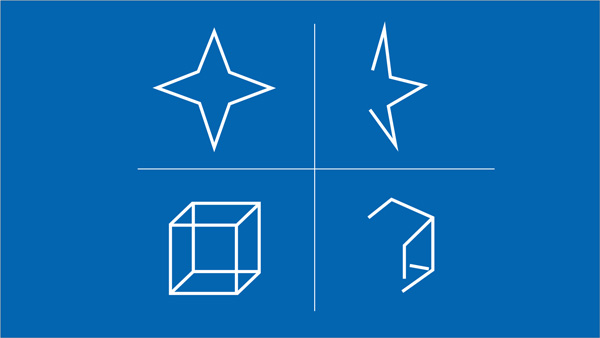Kessler Foundation Study Reveals Spatial Neglect Occurs After Brain Injury as Well as Stroke
Incidence of spatial neglect after brain injury warrants implementation of screening and treatment guidelines

figures missing the left sides of each. Credit: Kessler Foundation
East Hanover, NJ – December 21, 2023. A study conducted by Kessler Foundation has reported a notable incidence of spatial neglect among individuals undergoing rehabilitation for traumatic brain injury (TBI). The article, “Spatial neglect not only occurs after stroke, but also after traumatic brain injury” (doi: 10.1016/j.rehab.2023.101778), was published in the Annals of Physical and Rehabilitation Medicine on October 25, 2023. The authors are Peii Chen, PhD, of Kessler Foundation and Kimberly Hreha, EdD, OTR/L, of Duke University.
The findings have important implications for the rehabilitation of individuals with TBI, who have been understudied compared to stroke survivors. “We found that spatial neglect affects a substantial percentage of people with TBI,” said Dr. Chen, senior research scientist in the Center for Stroke Rehabilitation Research at the Foundation.
Spatial neglect is more likely to occur with right brain damage, with an incidence of 40 to 45 percent compared to 19 to 23 percent for left brain damage after stroke, according to previously published Foundation studies. This condition manifests as a failure to respond to stimuli on the side opposite the injury and difficulty in initiating or completing movements toward that side. Spatial neglect can lead to prolonged disability after brain damage by impairing daily functions and reducing the effectiveness of rehabilitation therapies.

the Center for Stroke Rehabilitation
Research at Kessler Foundation.
This study involved an implementation project across 16 U.S. rehabilitation hospitals, in which occupational therapists were trained to use the Kessler Foundation Neglect Assessment Process (KF-NAP®) to assess spatial neglect in individuals with neurological disorders. This standardized method incorporates the Catherine Bergego Scale (CBS) to measure impairment and categorize the severity of neglect. A total of 4,454 individuals were assessed, with 3,645 (82 percent) having had a stroke and 266 (6 percent) with TBI. The overall prevalence of spatial neglect was found to be 58 percent post stroke and 38 percent after TBI.
“It is clear from this study that neglect screening is warranted in TBI rehabilitation as well as in stroke rehabilitation programs,” Dr. Chen emphasized. “By extending timely treatment for spatial neglect to the population with TBI, we may improve their rehabilitation outcomes, optimize their recovery, and lessen the burdens of caregivers.”
Funding: Wallerstein Foundation for Geriatric Improvement; Charles and Ann Serraino Foundation
Visit Kessler Foundation Learning Center (kflearn.org) for information on tools for diagnosing and treating spatial neglect. For information on current stroke research studies, visit Studies | Kessler Foundation.
About Kessler Foundation
Kessler Foundation, a major nonprofit organization in the field of disability, is a global leader in rehabilitation research. Our scientists seek to improve cognition, mobility, and long-term outcomes, including employment, for adults and children with neurological and developmental disabilities of the brain and spinal cord including traumatic brain injury, spinal cord injury, stroke, multiple sclerosis, and autism. Kessler Foundation also leads the nation in funding innovative programs that expand opportunities for employment for people with disabilities. We help people regain independence to lead full and productive lives.